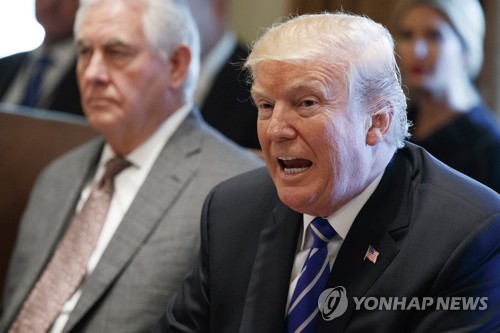
US President Donald Trump on Monday re-listed North Korea as a “state sponsor of terrorism.” The US Department of Treasury will announce new sanctions against North Korea on Tuesday, which are expected to take effect in two weeks.
Obviously, Washington has found an excuse to impose additional punishment on Pyongyang which has refused to give up its nuclear and missile programs.
In 2008, former US president George W. Bush removed North Korea from the “state sponsor of terrorism” list to push forward the Six-Party Talks. Now, with the opposite goal in mind, President Trump is pushing North Korea further away.
It is unwise for Washington to do so at the current stage. The new pressure on Pyongyang will not prompt it to change its stance on the nuclear issue, but will only trigger sharper response from Pyongyang.
The UN-approved international sanctions are already exerting intense pressure on North Korea. If Pyongyang carries out new nuclear and missile activities, the UN will impose more sanctions and unilateral US sanctions can also be expected.
Pyongyang has not engaged in these activities for the past two months, which is encouraging. Despite this lull, the US has somehow found it necessary to impose harsher measures on North Korea. This is clearly the wrong signal to send to North Korean leader Kim Jong-un.
Washington has viewed Pyongyang with a sense of superiority and has taken sanctioning and threatening Pyongyang for granted.
When we look at how North Korea continues to confront the US and how it deals with China, we can see that Pyongyang has overestimated its strategic position. A new round of confrontation between the US and North Korea seems likely.
It has become routine for the US and North Korea to show a hard-line stance and insult each other. But it requires highly-developed skills of a country to identify the goodwill of another and interact with it in an appropriate way.
Neither Washington nor North Korea wants war, but both are playing a game of chicken. Unfortunately, it is increasingly likely that the game will evolve into a serious conflict that all sides can hardly bear.
The US is a powerful country and its foreign policy can be highly flexible. But it has been fundamentally difficult for it to change its North Korea policy. The political flexibility of North Korea is far less, and it lacks strength to support such flexibility.
Therefore, it is even harder for North Korea to unilaterally change its US policy. It would be fairy-tale thinking to believe Pyongyang will change its stance on the nuclear issue after the US’ re-listing it as a “state sponsor of terrorism.”
Another game of tit-for-tat seems to be being played out on the Korean Peninsula, and North Korea will suffer the most. The other sides have consumed resources and been saddled with geopolitical annoyance. China has suffered from trade losses, but can bear it. The worsening political climate in North Korea has strained all the parties.
As neither the US nor North Korea listens to China, China will put more emphasis on coping with emergencies on the peninsula under the framework of the UN. As for the ever deepening animosity between Pyongyang and Washington, there is no need for Beijing to be more worried than the two.
Global Times EDITORIAL
The 21st Century
